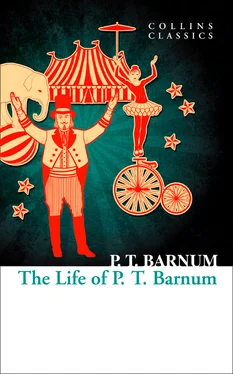Luckily or unluckily, our store was the resort of all these wits, and many is the day and evening that I have hung with delight upon their stories, and many the night that I have kept the store open until eleven o’clock, in order to listen to the last anecdotes of the two jokers who had remained long after their companions had gone to rest.
Inheriting a vital love of fun and an aptness for practical jokes, all that was said and done by these village wags was not only watched with the most intense pleasure by myself, but was also noted upon the tablets of a most retentive memory, whence I can now extract them without losing scarcely a word. Some of these specimens I will present to the reader hereafter. I will however here advert to a circumstance which will show how the whole neighborhood, as it were, would join in practising and perpetuating a joke.
It will be remembered that my grandfather, a few days after my birth, in consideration of my taking his name, presented me with a tract of land called “Ivy Island.” I was not four years of age before my grandfather informed me, with much seriousness, that I was a landowner; that he had given me a valuable farm on account of my name, etc.; and I am certain that not a week elapsed, from that period till I was twelve years of age, that I did not hear of this precious patrimony. My grandfather never spoke of me in my presence, either to a neighbor or stranger, without saying that I was the richest child in town, because I owned all “Ivy Island,” the most valuable farm in Connecticut. My mother often reminded me of my immense possessions, and my father occasionally asked me if I would not support the family when I came in possession of my property. I frequently assured my father, in the most perfect good faith, that he need give himself no uneasiness upon that score, for I would see that all the family wants were bountifully supplied when I attained my majority and received my estate. Our neighbors, too, reminded me a dozen times a day, that they feared I would refuse to play with their children, because I had inherited such immense wealth, while they had nothing of the sort.
These continual allusions to “Ivy Island,” for six or eight years, I fear excited my pride, and I know that the prospect made me wish that the slow-moving wheels of time would attain a rapidity which would hurry up that twenty-first birth-day, and thus enable me to become the nabob, which my grandfather’s generous foresight had cut me out for. How often, too, did I promise my playmates, when they rendered me a kind action, that when I became of age they should have a slice of “Ivy Island” that would make them rich for life! I sincerely intended to fulfil these promises to the letter. But, alas for the mutability of human affairs! an issue was at hand which I little expected, and one which was destined to effect a serious change in my hopes and aspirations.
One summer (I think it was 1822, at which period I was twelve years old) I asked my father’s permission to visit “Ivy Island.” He promised I should do so in a few days, as we should be getting hay in that vicinity. I scarcely slept for three nights, so great was my joy to think that, like Moses of old, I should be permitted to look upon the promised land. The visions of wealth which had so long haunted me in relation to that valuable locality now became intensified, and I not only felt that it must be a land flowing with milk and honey, but caverns of emeralds, diamonds, and other precious stones, as well as mines of silver and gold, opened vividly to my mind’s eye.
The wished-for morning at length arrived, and my father informed me that we were to mow in the meadow adjoining “Ivy Island,” and that I might visit it with our hired man during “nooning.” My grandfather kindly reminded me that when I came to look upon the precious spot, I was to remember that I was indebted to his bounty, and that if I had not been named “Phineas” I never could have been the proprietor of “Ivy Island.” My mother, too, had to put in a word.
“Now, Taylor,” said she, “don’t become so excited when you see your property as to let your joy make you sick, for remember, rich as you are, that it will be nine years before you can come into possession of your fortune.” I promised to be calm and reasonable.
“If you visit Ivy Island,” she continued, “you will lose your rest at noon, and you will feel tired, after turning hay all the forenoon. Had you not better lie under the trees and rest at ‘nooning,’ and visit Ivy Island at some other time?”
“No, my dear mother,” I replied, “I don’t care for nooning, I shall not feel tired, and I am so anxious to step upon my property, that I cannot wait any longer.”
“Well, go,” said my mother; “but don’t feel above speaking to your brothers and sisters when you return.”
I felt that this injunction was not altogether superfluous, for I already began to feel that it was rather degrading for me to labor as hard as those who had no estate settled upon them.
We went to work in our meadow. It was situated in that part of “Plum-Trees” known as “East Swamp.” When we arrived at the meadow I asked my father where “Ivy Island” was.
“Yonder, at the north end of this meadow, where you see those beautiful trees rising in the distance,” he replied.
I looked towards the place indicated, and my bosom swelled with inexpressible pride and delight, as I beheld for the first time the munificent gift of my honored and generous grandsire.
The forenoon soon slipped away; I turned the grass as fast as two men could cut it, and after making a hasty repast with my father and the workmen under the shade trees, our favorite “hired man,” a good-natured Irishman named Edmund, taking an axe upon his shoulders, told me he was ready to go with me to visit “Ivy Island.”
I started upon my feet with delight, but could not restrain asking him why he took an axe. He replied that perhaps I would like to have him cut into some of the beautiful specimens of timber upon my property, in order that I could see how superior it was in quality to that found in any other part of the world. His answer was perfectly satisfactory, and we started. As we approached the north end of the meadow the ground became swampy and wet, and we found great difficulty in proceeding. We were obliged to leap from bog to bog, and frequently making a mis-step, I found myself up to my middle in water. At one time I stood upon a bog, and the next was so far off that I greatly feared I could not reach it. My companion, who was several rods in advance of me, saw my dilemma, and called out for me to leap stoutly and I should succeed.
“I am sure I cannot,” I replied; “and if I could, I shall be worse off when I reach the next bog than I am now, for there is no place near it that is above water.”
“You are a little off from the regular track,” responded my Hibernian friend; “but never mind, you will have to wade a little.”
“The water will be over my head, and I shall be drowned,” I replied, in a most despairing tone.
“Divil a danger at all at all, for the water is not four feet deep in the deepest place,” was the reply.
“If I go under, you must help me out,” I replied tremblingly.
“To be sure I will; so never fear, but give a strong jump, and you are all safe,” was the encouraging response.
I summoned all my strength, clenched both my hands, sprang with all my force, and just saved myself by striking upon the edge of the next bog. I straightened myself up, got upon the middle of the bog, and began to prepare for wading in the water, which I greatly feared would be too deep for me to ford, when I saw countless hornets rising from the spot on which I stood. Instantly they came buzzing about my face and ears. One vicious rascal stung me on the tip of my nose, and, shrieking with the smart, I leaped into the water regardless of consequences. I soon found myself up to my neck, and fearful that the next step would carry me under water altogether, I roared lustily for help.
Читать дальше












